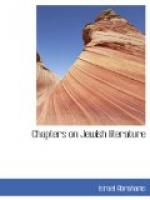Graetz.—III, p. 138 [140].
SAMUEL IBN NAGDELA.
Graetz,—III, p, 254 [260].
CHAPTER X
THE SPANISH-JEWISH POETS (I)
Solomon Ibn Gebirol.—“The
Royal Crown.”—Moses Ibn
Ezra.—Abraham
Ibn Ezra.—The Biblical Commentaries of Ibn
Ezra
and the Kimchis.
“In the days of Chasdai,” says Charizi, “the Hebrew poets began to sing.” We have seen that the new-Hebrew poetry was older than Chasdai, but Charizi’s assertion is true. The Hebrew poets of Spain are melodious, and Kalir is only ingenious. Again, it was in Spain that Hebrew was first used for secular poetry, for love songs and ballads, for praises of nature, for the expression of all human feelings. In most of this the poets found their models in the Bible. When Jehuda Halevi sang in Hebrew of love, he echoed the “Song of Songs.” When Moses Ibn Ezra wrote penitential hymns, or Ibn Gebirol divine meditations, the Psalms were ever before them as an inspiration. The poets often devoted all their ambition to finding apt quotations from the sacred text. But in one respect they failed to imitate the Bible, and this failure seriously cramped their genius. The poetry of the Bible depends for its beauty partly on its form. This form is what is called parallelism of line. The fine musical effect produced by repeating as an echo the idea already expressed is lost in the poetry of the Spanish Jews.
Thus Spanish-Jewish poetry suffers, on the one side, because it is an imitation of the Bible, and therefore lacks originality, and on the other side it suffers, because it does not sufficiently imitate the Biblical style. In spite of these limitations, it is real poetry. In the Psalms there is deep sympathy for the wilder and more awful phenomena of nature. In the poetry of the Spanish Jews, nature is loved in her gentler moods. One of these poets, Nahum, wrote prettily of his garden; another, Ibn Gebirol, sang of autumn; Jehuda Halevi, of spring. Again, in their love songs there is freshness. There is in them a quaint blending of piety and love; they do not say that beauty is a vain thing, but they make beauty the mark of a God-fearing character. There is an un-Biblical lightness of touch, too, in their songs of life in the city, their epigrams, their society verses. And in those of their verses which most resemble the Bible, the passionate odes to Zion by Jehuda Halevi, the sublime meditations of Ibn Gebirol, the penitential prayers of Moses Ibn Ezra, though the echoes of the Bible are distinct enough, yet amid the echoes there sounds now and again the fresh, clear voice of the medieval poet.
Solomon Ibn Gebirol was born in Malaga in 1021, and died in 1070. His early life was unhappy, and his poetry is tinged with melancholy. But his unhappiness only gave him a fuller hope in God. As he writes in his greatest poem, he would fly from God to God:




